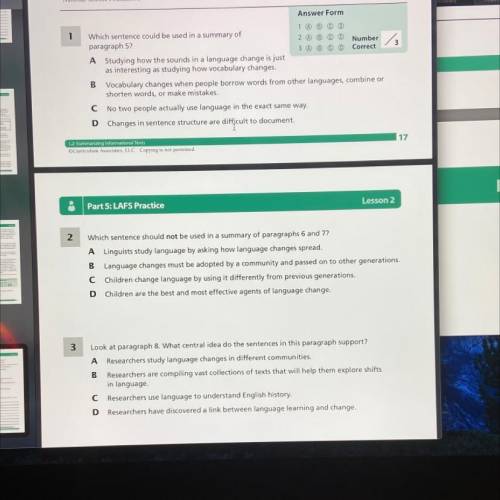.
Part 5: Common Core Practice Lesson 2
pea or many peas. At some point, people mi...

English, 29.03.2020 20:05 yanmanuel2215
.
Part 5: Common Core Practice Lesson 2
pea or many peas. At some point, people mistakenly assumed that the word pease was the plural form of pea, and a new word was born. While vocabulary can change quickly, sentence structure—the order of words in a sentence—changes more slowly. Yet it’s clear that today’s English speakers construct sentences very differently from Chaucer and Shakespeare’s contemporaries (see [table] above). Changes in sound are somewhat harder to document, but at least as interesting. For example, during the so-called “Great Vowel Shift”1 500 years ago, English speakers modified their vowel pronunciation dramatically. This shift represents the biggest difference between the pronunciations of so called Middle and Modern English.
Agents of Change
6 Before a language can change, speakers must adopt new words, sentence structures and sounds, spread them through the community and transmit them to the next generation. According to many linguists—including David Lightfoot, NSF2 assistant director for social, behavioral and economic sciences—children serve as agents for language change when, in the process of learning the language of previous generations, they internalize it differently and propagate a different variation of that language.
7 Linguists study language change by addressing questions such as these: Can we trace the evolutionary path of a language? How do language changes spread through communities? How do historical circumstances influence language change? What is the relationship between language learning and change?
Paths of Change
8 NSF researcher Anthony Kroch of the University of Pennsylvania is trying to understand how language change spreads through populations. With collaborator Beatrice Santorini, he is compiling an electronic collection of Modern English texts covering the time period from 1700 to 1914 (the beginning of World War I). The completed “corpus,” as it is known, will complement three others created independently over the past decade by researchers from the University of Pennsylvania and the University of York, England. The existing works—which span 900 years of English history—contain more than 4.5 million words of text carefully tagged and annotated for linguistic features. The publicly available collection gives researchers a standardized, searchable document to track changes in the English language over time. It helps them explore language shifts in a historical context and examine the link between language learning and change.
1 During the Great Vowel Shift of the fifteenth through the eighteenth centuries, English speakers gradually changed the way they pronounced vowels.
2 National Science Foundatio


Answers: 2


Another question on English

English, 21.06.2019 13:00
Consider the last two lines of the poem again. why do you think the old woman sees herself as a terrible fish? why did she choose to compare her to a fish? why do you think she chose to use the word "terrible"? write your answer in two hundred words.
Answers: 2

English, 21.06.2019 21:00
How will charlie most likely change after his experience at the diner in part 2 of "flowers for algernon"? he should be kind to each person who crosses his path. he will be more sympathetic to those who are similar to the way he once was. he will attempt to the dishwasher receive the surgery he was given. he will react the same way each time he sees someone being treated unfairly.
Answers: 2


English, 22.06.2019 15:00
What is being said in the prologue? what is being foreshadowed? in romeo and juliet?
Answers: 2
You know the right answer?
Questions








Mathematics, 17.07.2019 01:30





Mathematics, 17.07.2019 01:30

Mathematics, 17.07.2019 01:30

English, 17.07.2019 01:30

Mathematics, 17.07.2019 01:30


Mathematics, 17.07.2019 01:30


History, 17.07.2019 01:30



